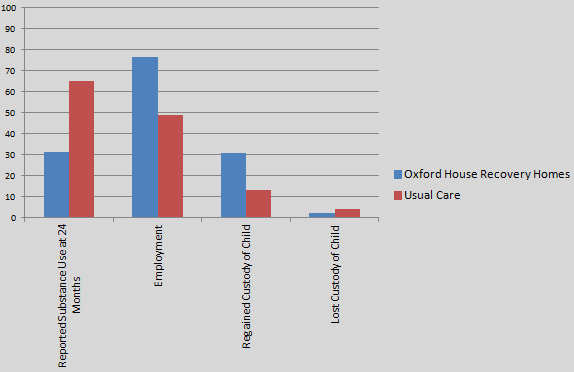The Characteristics & Effectiveness of Oxford House Recovery Residences: 2010 Review
Oxford Houses are a community-based, mutual-help residential community where participants seeking recovery from substance use disorders must obtain jobs, pay utility bills, and refrain from disruptive behavior.
Oxford Houses are found in 42 states and 383 cities in the US and in 2008 served 9,825 people. It has been found that members use numerous strategies to address behavioral problems, including by providing rewards for the successful achievement of specified goals. Additionally, the self-governing policies found in Oxford Houses help to create and nurture abstinence-specific social support networks.
A 2010 article examined the characteristics of the houses and participants and also reviewed two studies funded by the National Institute of Alcohol Abuse and Alcoholism (NIAAA) and the National Institute of Drug Abuse (NIDA).
Jason and Ferrari randomized 150 individuals to live in either an Oxford House or (receive community-based aftercare services (usual Care)).
Notably:
- 31.3% of participants assigned to the Oxford House condition reported substance use at 24 months compared to 64.8% of the participants in the usual care condition
- Oxford House residents had greater employment
- Oxford House residents had fewer days engaged in illegal activities
- Oxford House residents were more likely to regain custody of their children
- Oxford House residents were less likely to lose custody of their children compared to the usual care condition

In a different study, Jason and Ferrari also examined abstinence-specific social support and successful abstention from substance use in a national sample of more than 900 Oxford House residents.
This study found that 81.5% of the participants who left Oxford House residences, reported no substance use during the following 1 year.
Another change that was identified was the increase in the percentage of individuals in social networks who were either abstainers or in recovery. This study also found that children present in Oxford Houses positively impacted both parents and other members, and that the well-managed and governed recovery homes posed minimal risks to neighbors.
IN CONTEXT
Oxford Recovery Houses appear to provide an effective and inexpensive alternative for many individuals seeking recovery. The findings also suggest that Oxford Houses may be appropriate for a variety of individuals with an assortment of needs and that living in a substance-free environment without restrictions on length of stay may help individuals remain abstinent.
CITATIONS
Jason, L. A., & Ferrari, J. R. (2010). Oxford house recovery homes: Characteristics and effectiveness. Psychological services, 7(2), 92.
Jason, L. A., Davis, M. I., & Ferrari, J. R. (2007). The need for substance abuse after-care: Longitudinal analysis of Oxford House. Addictive Behaviors, 32(4), 803-818.

